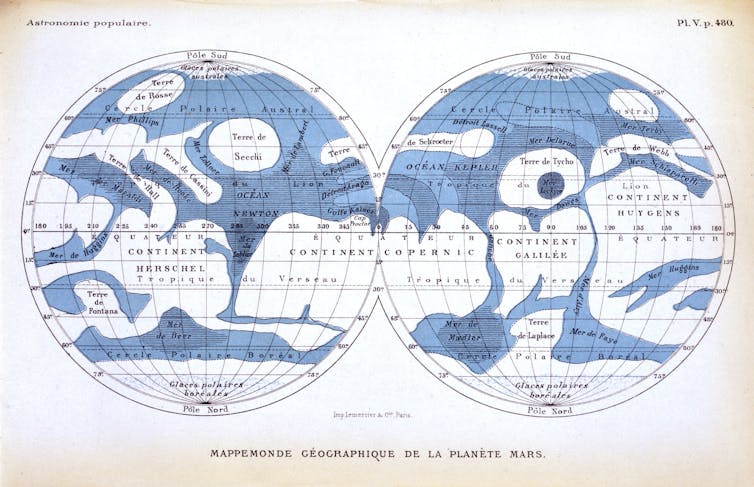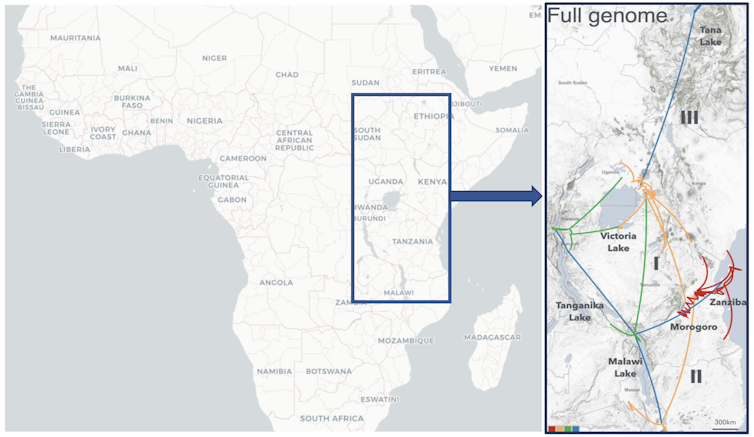Source: – By Gilles Pison, Anthropologue et démographe, professeur au Muséum national d’histoire naturelle et chercheur associé à l’INED, Muséum national d’histoire naturelle (MNHN)

En France, au milieu du XVIIIe siècle, l’espérance de vie à la naissance était de moins de 30 ans ; elle a presque triplé depuis (voir la figure 1 ci-dessous). Au cours de la période récente, c’est-à-dire depuis le milieu du XXe siècle, elle a progressé de près de trois mois en moyenne par an – soit six heures par jour –, passant de 66,4 ans en 1950 à 82,5 ans en 2017.
Va-t-elle continuer à augmenter ? Jusqu’où ? Elle progresse en effet moins vite depuis quelque temps, de deux mois en moyenne par an. Est-ce le signe qu’elle se rapproche des limites ? Pour y voir plus clair, analysons son évolution passée et les facteurs expliquant sa formidable progression jusqu’ici.
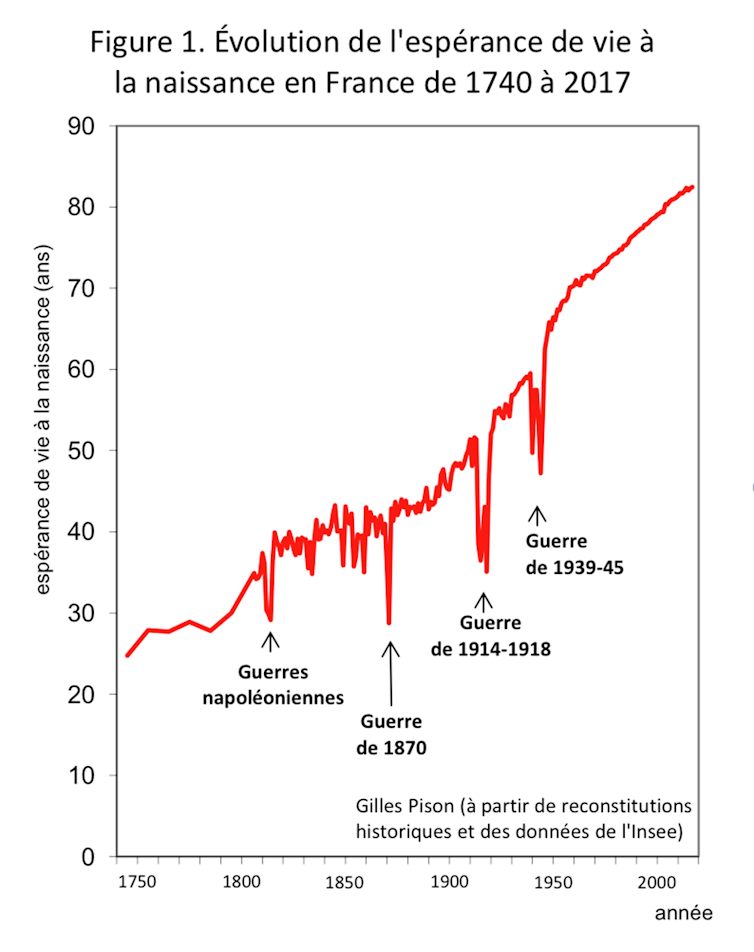
Gilles Pison (à partir de reconstitutions historiques et des données de l’Insee), CC BY-NC-ND
Le recul de la mortalité infantile, un facteur déterminant
La progression de l’espérance de vie n’a pas été régulière au cours des deux siècles et demi passés. Elle a été interrompue par les conflits (guerres napoléoniennes, guerres de 1870, 1914-1918 et 1939-1945) qui ont entraîné des reculs importants. Mais ceux-ci n’ont duré que le temps du conflit, la progression reprenant ensuite la tendance de fond.
Les progrès s’accélèrent à certaines périodes, comme au tournant du XVIIIe et du XIXe siècle, ou cent ans plus tard, à la fin du XIXe siècle. Ils ralentissent à d’autres, comme entre 1850 et 1870. Ces variations sont parallèles à celles de la mortalité des enfants, encore très élevée à ces époques, et qui pèse beaucoup sur la durée de vie moyenne.
Ainsi, la moitié des enfants mourait avant l’âge de 10 ans en France au milieu du XVIIIe siècle, ce qui explique la très faible espérance de vie (25 ans). Autour de 1800 la mortalité des enfants recule fortement grâce en partie à la vaccination contre la variole : le risque pour un nouveau-né de mourir dans sa première année diminue d’un tiers en deux décennies, passant de 275 pour mille à 185 pour mille, comme le montre la figure 2. L’espérance de vie fait un bond de 10 ans.

Gilles Pison (à partir de reconstitutions historiques et des données de l’Insee), CC BY-NC-ND
Au milieu du XIXe siècle, la mortalité infantile remonte du fait de l’industrialisation et l’urbanisation qui dégradent les conditions de vie des enfants, notamment dans les villes. L’espérance de vie stagne. À l’inverse, à la fin du XIXe siècle et dans la première moitié du XXe siècle, les progrès de l’hygiène et de la médecine liés à la révolution pastorienne, dont les enfants ont été les premiers bénéficiaires, et aussi la mise en place des premières politiques de protection de la petite enfance, entraînent une forte augmentation de l’espérance de vie.
Au sortir de la Deuxième Guerre mondiale, l’espérance de vie récupère la tendance de fond et atteint 66,4 ans en 1950. Elle poursuit ensuite sa progression au rythme de près de 3 mois en plus par an en moyenne.
Mais le rythme a un peu baissé depuis 2010, deux mois en plus par an seulement en moyenne comme déjà mentionné, laissant penser que l’allongement de la vie pourrait bientôt atteindre ses limites.
Un précédent ralentissement il y a 50 ans
Un phénomène similaire de ralentissement des progrès s’est produit il y a 50 ans, visible à la figure 3 qui zoome sur la période récente. Alors que l’espérance de vie à la naissance (sexes confondus) a augmenté de 4 ans au cours de la décennie 1950, elle n’a crû que de 1,7 an au cours de la décennie 1960.
Durant ces décennies, la progression de l’espérance de vie vient encore pour partie du recul de la mortalité infantile. Elle a baissé de moitié entre 1950 et 1960, passant de 51 décès d’enfants de moins d’un an pour mille naissances, à 27 ‰, et a continué de diminuer pendant la décennie suivante pour atteindre 18 ‰ en 1970. Mais le niveau atteint est si bas qu’elle ne représente plus désormais qu’une faible part de la mortalité, et même si son recul se poursuit (elle est de 4 ‰ en 2017), il n’a pratiquement plus d’effet sur l’espérance de vie.
Celle-ci ne peut progresser qu’en raison des succès remportés dans la lutte contre la mortalité adulte, en particulier aux âges élevés où se concentrent de plus en plus les décès.
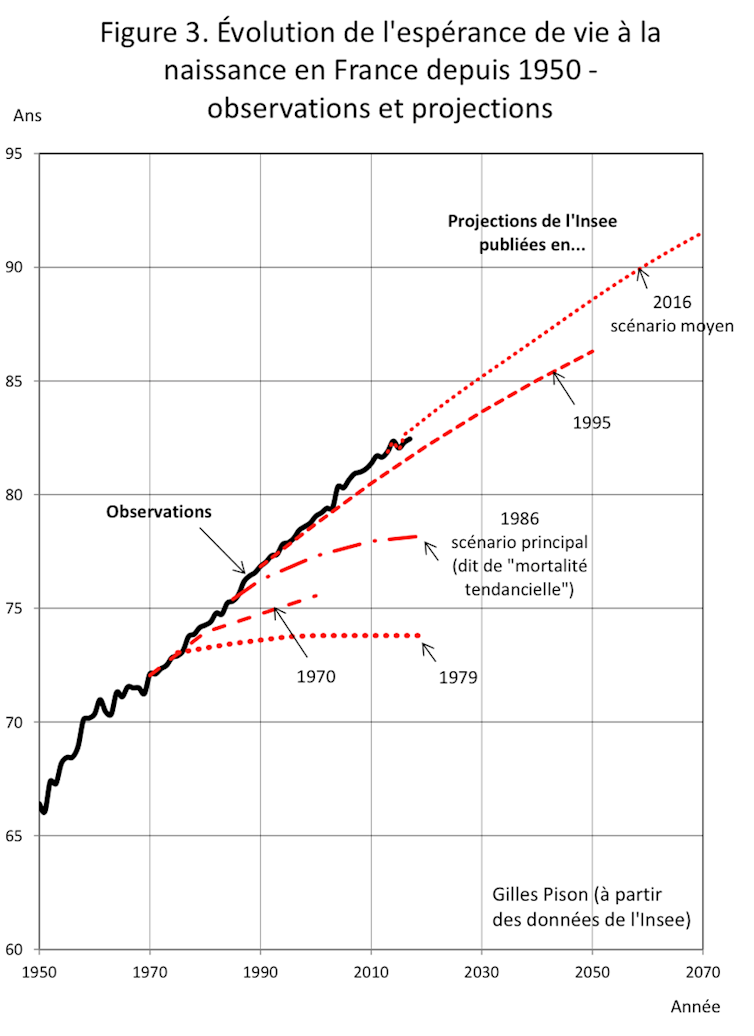
Gilles Pison (à partir des données de l’Insee), CC BY-NC-ND
Des scénarios pessimistes démentis par la réalité, l’idée du plafonnement abandonnée
Les possibilités de diminution de la mortalité à ces âges ne peuvent être que limitées, pense-t-on il y a 50 ans, et l’espérance de vie va rapidement buter sur un plafond biologique.
Le ralentissement des années 1960 vient conforter cette vision. Celle-ci se reflète dans les scénarios d’évolution de l’espérance de vie qu’élabore l’Insee pour projeter la population de la France (voir la figure 3 ci-dessus).
Ainsi, la projection publiée en 1979 considère que l’espérance de vie va plafonner à 73,8 ans en 2000, or ce seuil a été dépassé l’année même où elle a été publiée, l’espérance de vie ayant atteint 74,1 ans en 1979. Tenant compte de l’énorme décalage entre les projections précédentes et la réalité, la projection de 1986 fait progresser l’espérance de vie nettement plus rapidement tout en conservant l’hypothèse d’un ralentissement puis d’un plafonnement à terme.
Mais, comme dans les projections antérieures, le plafond de la projection de 1986 est atteint puis dépassé (en 1997). Le constat que les plafonds même rehaussés sont régulièrement dépassés au bout de quelques années conduit à l’abandon de l’idée même de plafonnement dans les projections suivantes.
Celles-ci extrapolent la tendance courante sur toute la période de projection, se contentant de l’infléchir très progressivement sans toutefois fixer de limite. Elles correspondent assez bien à l’évolution observée pour l’instant.
Les succès de la lutte contre la mortalité des personnes âgées
Si les projections ont longtemps sous-estimé les progrès de l’espérance de vie, c’est qu’elles n’ont pas anticipé la forte baisse de la mortalité des adultes et des personnes âgées. Il faut dire que les progrès dans ce domaine sont relativement récents, comme le montre l’évolution de l’espérance de vie à 60 ans sur la figure 4 ci-dessous.
Au milieu du XXe siècle, elle était encore proche de son niveau du XIXe siècle, notamment du côté masculin : un homme de 60 ans pouvait espérer vivre encore 13 à 14 ans. Ce n’est qu’à partir de la fin de la Deuxième Guerre mondiale qu’elle commence à augmenter chez les hommes, les progrès s’accélérant ensuite jusqu’à ce qu’elle atteigne 23,2 ans en 2017, soit 7,3 ans de plus qu’en 1967. La progression a commencé plus tôt chez les femmes, dès les premières décennies du XXe siècle, et elle s’est aussi accélérée à partir de la fin de la guerre jusqu’à 27,6 ans en 2017, soit 7,2 ans de plus qu’en 1967.
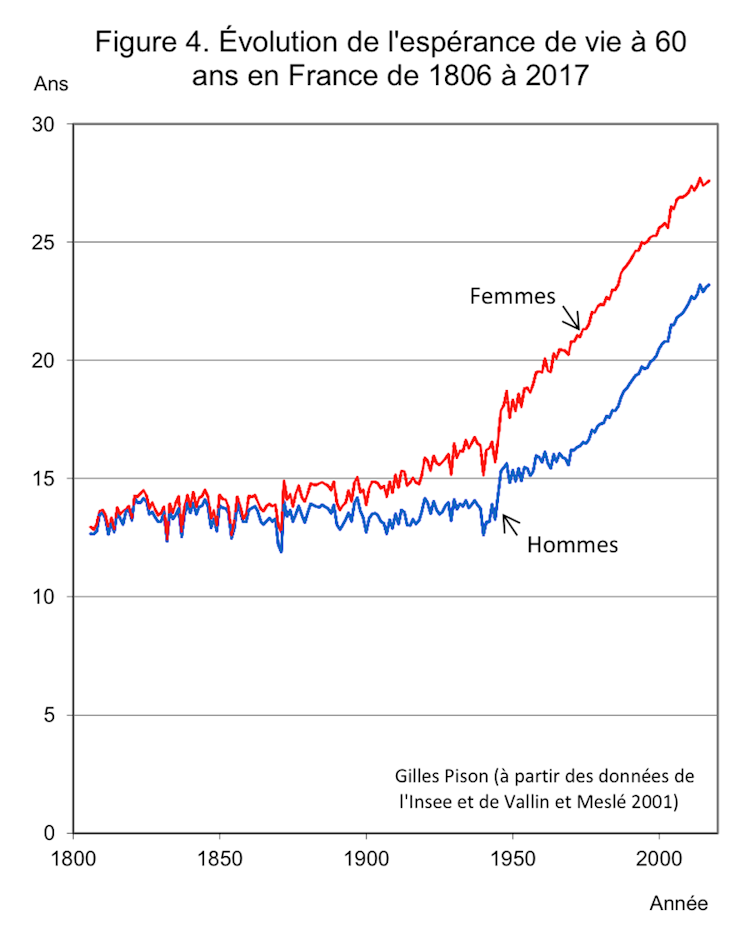
Gilles Pison (à partir des données de l’Insee et de Vallin et Meslé 2001), CC BY-NC-ND
La révolution cardiovasculaire
Au milieu du XXe siècle, les maladies infectieuses étaient encore la cause d’une partie importante des décès d’adultes et de personnes âgées, et leur recul a entraîné une augmentation sensible de l’espérance de vie à 60 ans. Mais, comme pour les enfants, la part de ces maladies dans la mortalité totale a beaucoup régressé et les gains à attendre de la poursuite de leur recul sont faibles.
Les maladies cardiovasculaires et les cancers sont désormais les principales causes de décès à ces âges, comme le montre la figure 5 ci-dessous. Et ce sont les succès rencontrés dans la lutte contre ces maladies qui ont permis à la mortalité des adultes et des personnes âgées de poursuivre sa baisse à partir des années 1970, et à l’espérance de vie de continuer à augmenter.
La mortalité due aux maladies du cœur et des vaisseaux a énormément diminué depuis un demi-siècle grâce à la « révolution cardiovasculaire » qu’ont constitué les progrès de la prévention et des traitements dans ce domaine. Quant à la mortalité par cancer, qui avait augmenté, elle régresse maintenant grâce aux diagnostics plus précoces et à la réduction des comportements à risques comme le tabagisme.
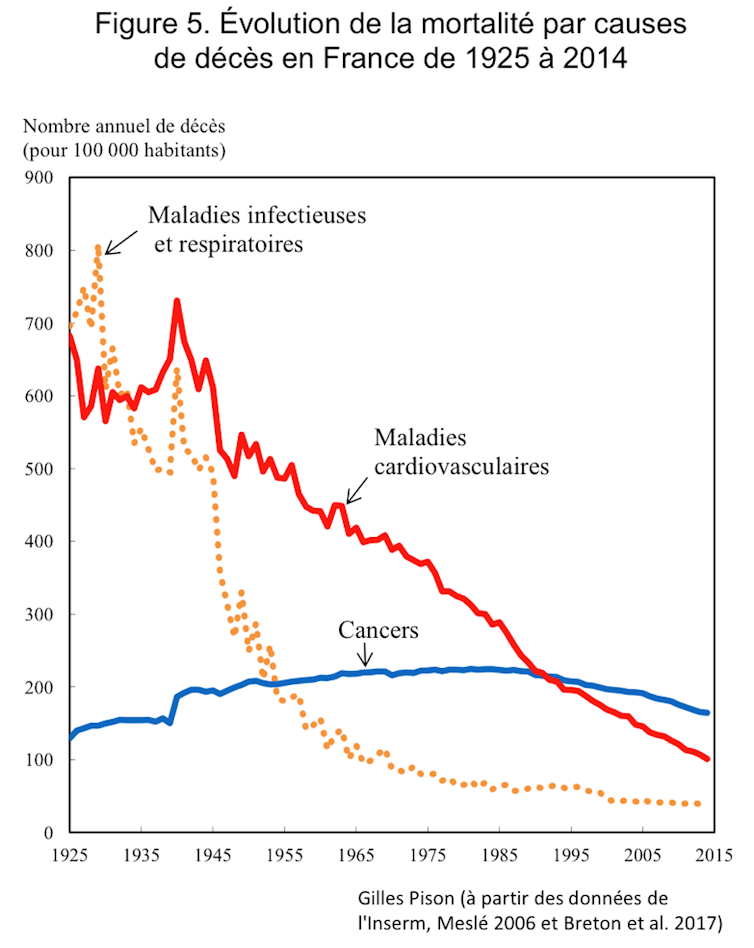
Gilles Pison (à partir des données de l’Inserm, Meslé 2006 et Breton et coll. 2017), CC BY-NC-ND
Les conditions d’une espérance de vie toujours en progrès
Le ralentissement des progrès de l’espérance de vie depuis une dizaine d’années est peut-être le signe que les retombées de la révolution cardiovasculaire sont en voie d’épuisement.
Et les progrès futurs pourraient dépendre de plus en plus de la lutte contre les cancers qui sont devenus la première cause de décès. Si celle-ci engrange les succès, les retombées en termes d’espérance de vie ont été moins spectaculaires jusqu’ici que celles liées à la révolution cardiovasculaire. Il faudrait que le recul de la mortalité liée aux cancers s’accélère dans les prochaines décennies si l’on veut que l’espérance de vie continue de progresser de 3 mois par an.
À plus long terme, comme pour les avancées liées à la lutte contre les infections, celles liées à la lutte contre les maladies cardiovasculaires et les cancers devraient s’épuiser un jour. De nouveaux terrains de lutte comme les maladies neurodégénératives (maladies d’Alzheimer, de Parkinson, etc.) et des innovations médicales et sociales pourraient alors prendre le relais et ouvrir une nouvelle phase de progrès sanitaire.
Ce qui pourrait non pas conduire à l’immortalité, vieux rêve inaccessible, mais remettre de nouveau à plus tard le calcul d’une limite à la progression de l’espérance de vie.
![]()
Gilles Pison ne travaille pas, ne conseille pas, ne possède pas de parts, ne reçoit pas de fonds d’une organisation qui pourrait tirer profit de cet article, et n’a déclaré aucune autre affiliation que son organisme de recherche.
– ref. Espérance de vie : peut-on gagner six heures par jour indéfiniment ? – https://theconversation.com/esperance-de-vie-peut-on-gagner-six-heures-par-jour-indefiniment-98188





